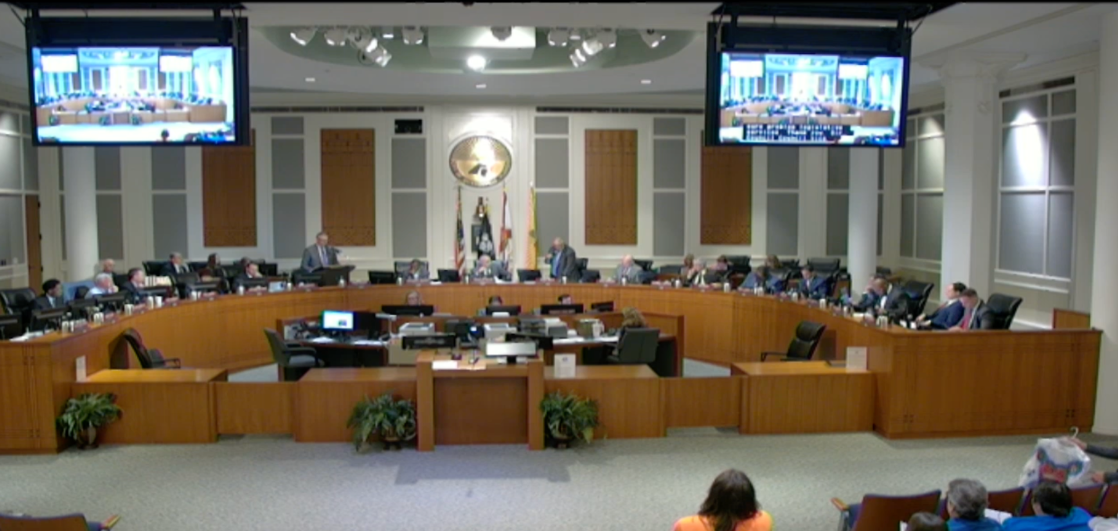The Jacksonville City Council voted Tuesday in favor of legislation that will make it harder for the city to settle lawsuits against some employees, possibly putting those employees in jeopardy if a trial doesn’t end in their favor.
Tyrona Clark-Murray, Ju’Coby Pittman, Rahman Johnson and Jimmy Peluso were the only council members to vote against the legislation. The 15 other council members supported the bill.
Sheriff T.K. Waters asked for the legislation because he was disappointed that he wasn’t notified in advance about a $200,000 settlement in a lawsuit against one of his officers who killed 22-year-old Jamee Johnson during a traffic stop in 2019.
However, records showed that the officer who was sued and two members of the Office of General Counsel, which included the attorney for the Jacksonville Sheriff’s Office, were invited to the mediation meeting May 30 when the city agreed to the settlement.
The legislation means the city can no longer settle certain lawsuits without permission from the sheriff, tax collector, property appraiser, supervisor of elections or clerk of courts if the lawsuit is related to one of their offices. No other municipality has codified legislation like this, city Finance Director Anna Brosche said.
The council said yes to an amendment that allows the council president to approve a settlement even if the constitutional officer rejects it.
When the city settles lawsuits, it usually ends claims against individual employees, including police officers, without needing them to pay anything. If those cases went to trial under this new legislation, the employees may be made to pay any judgments if a judge or jury finds them at fault.
Under the new law, even if an individual police officer asks the city to settle and the city’s lawyers and risk managers agree that’s the right tact, the city must get approval from the sheriff. If the sheriff refuses to approve and the City Council president refuses to override him, the police officer may be forced to go to trial.
Brosche and Michael Fackler, the city’s top attorney, asked the council last week to consider allowing the departments to draft a policy requiring frequent communication between their offices and constitutional officers during lawsuit mediations instead of changing the law. Brosche reiterated the position Tuesday and said the legislation was unnecessary regulation.
Josh Becksmith, an insurance broker with Brown & Brown, also warned council members last week that adopting the legislation could cause the city’s insurance premiums to increase at taxpayer expense or cause insurance providers to drop the city altogether.
The Sheriff’s Office’s argument for the legislation came from the department’s organizational strategic executive, Lara Mattina, who gave a fiery plea that the settlement caused reputational damage to the department but didn’t acknowledge the potential harm the legislation could cause to police officers.
At the meeting, Waters declined to answer Councilman Jimmy Peluso’s questions.
Because Waters wouldn’t take the questions, Peluso questioned Mattina as to why the sheriff requested the legislation as a reaction to one settlement when he hadn’t requested any legislative fixes in response to the racist killings at Dollar General or the large number of jail deaths last year.
The council, Peluso said, was spending time responding to one settlement instead of finding ways to give more money to corrections officers or restore police pensions that were eliminated under former Mayor Lenny Curry.
Mattina, who grew noticeably irritated at the questions, fired back and said that just because the department wasn’t in front of the council on other issues didn’t mean work wasn’t being done within the office. She also pushed back on Peluso’s comment that the bill was in response to one settlement.
She said the legislation wasn’t a “reaction” to the settlement with Jamee Johnson even though she conceded the settlement “certainly was the thing that was the impetus.”
The Fraternal Order of Police Lodge 5-30 endorsed the legislation even though it will increase the liability risk for individual officers. The union did not answer The Tributary’s request for an interview last week. In a statement given to council members, the police union said, “This measure will also help prevent settlements from being made that could potentially undermine the morale and effectiveness of our local law enforcement.”
On Wednesday morning, Waters commended the council for “their support and shared vision of a safer Jacksonville.”
“Our officers dedicate their lives to public service, often facing dangerous and challenging situations that can leave them entangled in legal disputes,” the sheriff wrote. “This ordinance ensures that decisions to settle a case are made in the best interest of both the officers involved and the community they serve. Additionally, it will help prevent settlements from being made that could potentially undermine the morale and effectiveness of our agency.”
Everyone on either side of the debate has agreed that Waters and other constitutional officers should be involved in these conversations, but the disagreement lies in whether the city should require their approval before settling.
During public comment at Tuesday’s council meeting, 18 people spoke against the legislation, saying it gave the sheriff too much power. Pittman, who previously said she was on the fence about the bill, said she voted against it because of the constituents who asked her to vote no.
“I’m gonna have to go with the people,” she said.
Councilman Raul Arias criticized Pittman’s comments, saying “the people” he cared about were police officers. He also criticized Councilman Johnson for offering a detailed amendment, saying it was inappropriate for council members to propose amendments on the night the council would vote, even though it is a common practice.
Thirty-two people, including members of the Northside Coalition of Jacksonville, Jacksonville Branch NAACP, Jacksonville NOW and the Jacksonville Community Action Committee, co-signed a letter to the full council Tuesday morning asking for the legislation to be voted down for a number of reasons, including that it would undermine the authority and expertise of the city’s Risk Management team, which evaluates the merits and costs of lawsuits.
Councilman Johnson — who had expressed concerns that the legislation gives too much power to one person — submitted an amendment that would have required a small committee of people to vote on how to handle a lawsuit with a settlement of over $200,000. Under that proposal, one person would not make the final decision.
“I believe having a group being able to make these decisions is what needs to happen so there’s some kind of checks and balances system,” Johnson said Tuesday. “And if that group doesn’t agree, it brings it back to the council.”
The amendment didn’t pass.
Lead image: The Jacksonville City Council meets on Tuesday, Feb. 13, 2024.
This story is published through a partnership between Jacksonville Today and The Tributary.







